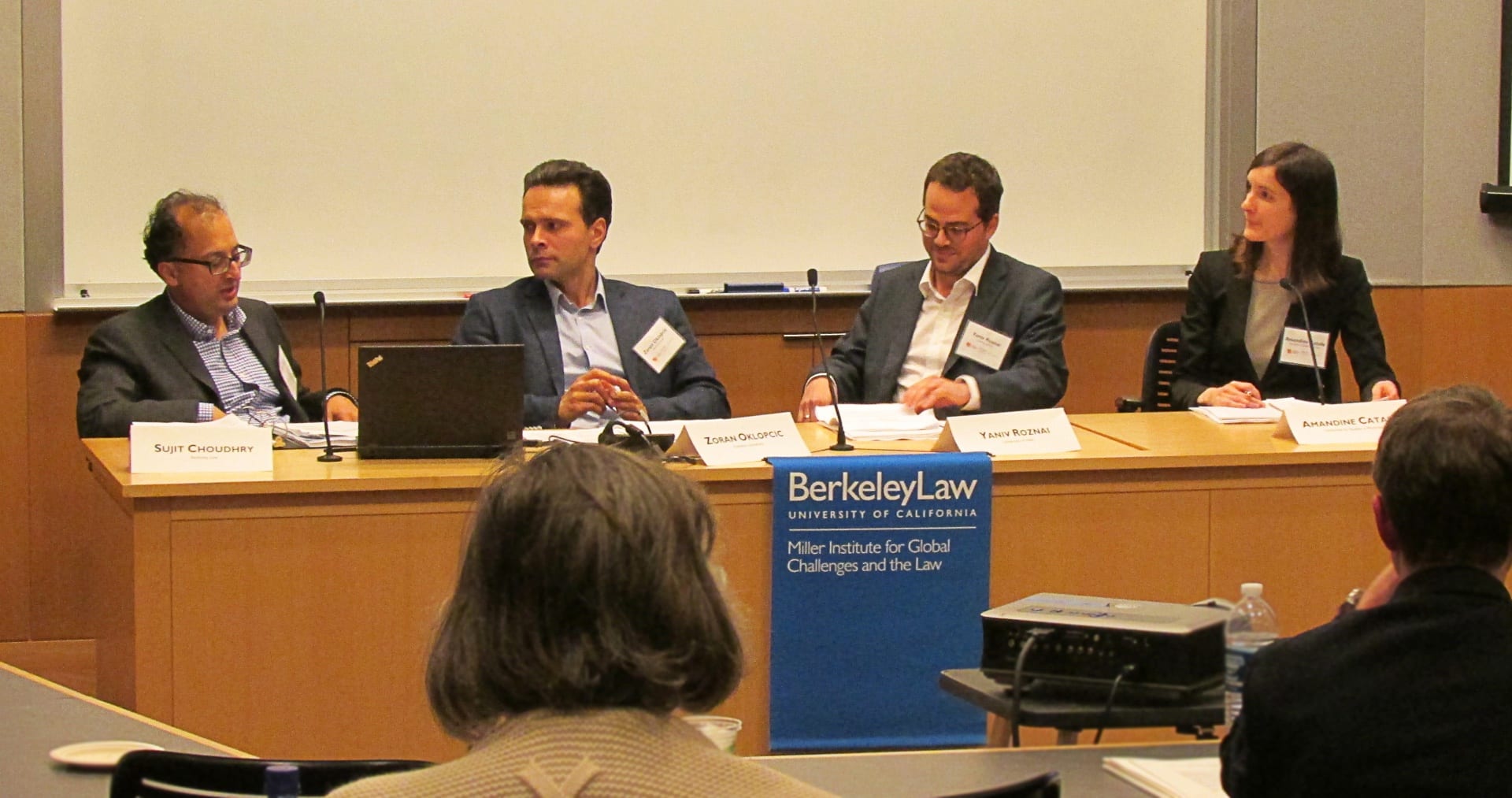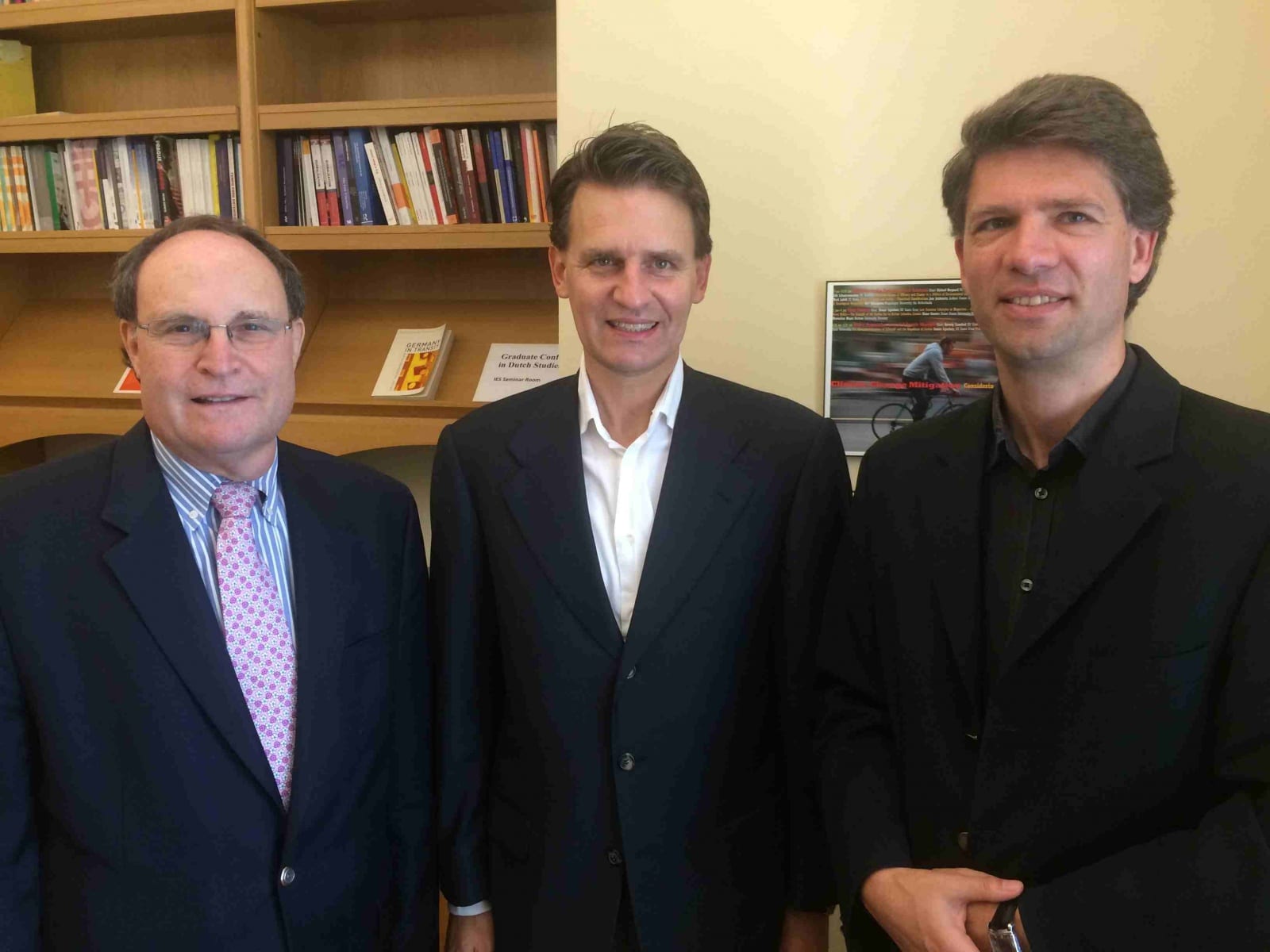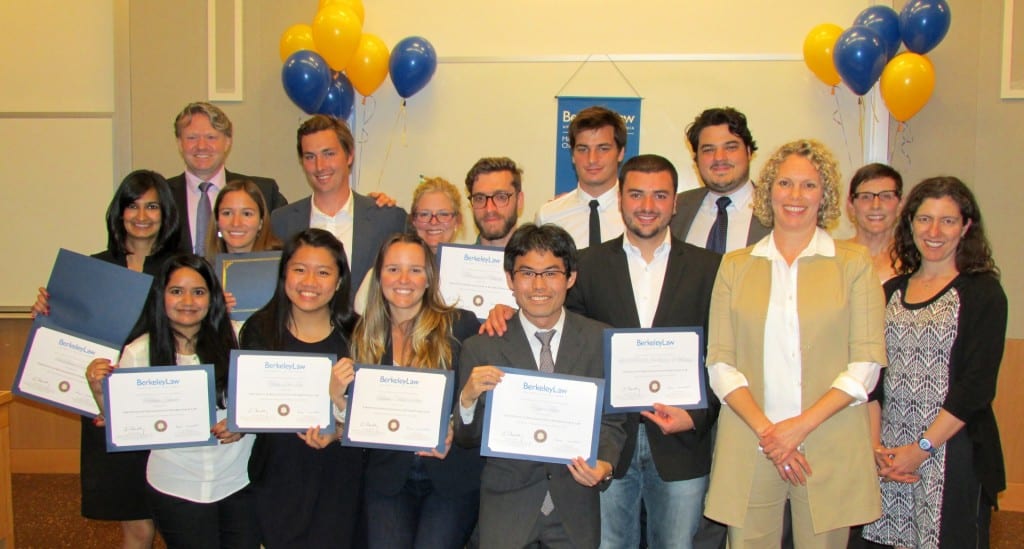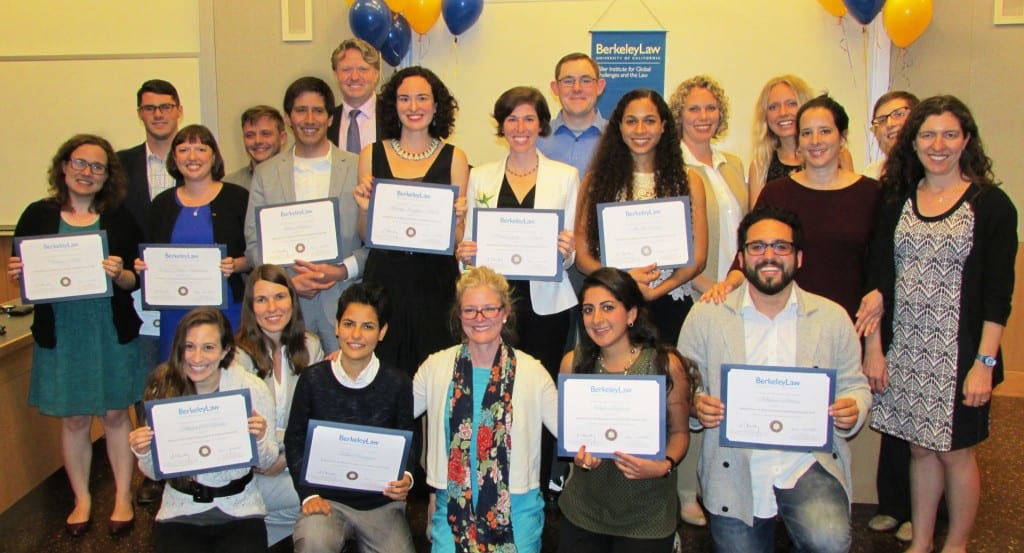January 7-9, 2015 (Wednesday-Friday)
.jpg) International Humanitarian Law Workshop for Students
International Humanitarian Law Workshop for Students
Boalt Hall, 9:00 am-5:00 pm
Co-sponsored with the International Committee of the Red Cross
Professor Kate Jastram chairs this popular three-day workshop, which combines lectures and hands-on small group exercises on international humanitarian law (IHL), or the law of war. The workshop is open to a limited number of law students from around the country, and is taught by legal professionals from the International Committee of the Red Cross, lawyers for the US Armed Forces, and law professors who specialize in IHL.
For more information, see the IHL Workshop website.
.jpg)
David Glazier, Loyola Law School, giving his lecture on
“Cyber and Other Emerging Technologies,” IHL Student Workshop 2015
February 8-9, 2015 (Sunday-Monday)
Editorial Meeting of the International Journal of Transitional Justice
Boalt Hall
Professor Laurel Fletcher will chair the annual meeting of the editorial board of the International Journal of Transitional Justice. This year’s guest editor is Juan E. Méndez, a lawyer and human rights activist known for his work on behalf of political prisoners.
.jpg)
February 9, 2015 (Monday)
Lecture on “The Struggle to End Torture”
.jpg) Juan E. Méndez
Juan E. Méndez
UN Special Rapporteur on Torture and
Professor of Human Rights Law in Residence
American University Washington College of Law
170 Law Building, 12:45-2:00 pm
To reserve a lunch, please RSVP here.
RSVPs will be accepted until 9am on Monday, February 9th
RSVPs are not required, but appreciated
Co-sponsored with the Henderson Center for Social Justice
This lunchtime talk will feature Juan Méndez, who has served as UN Special Rapporteur on Torture and Other Cruel, Inhuman and Degrading Treatment or Punishment since 2010. A native of Argentina, Mr. Méndez has dedicated his legal career to the defense of human rights and has a long and distinguished record of advocacy throughout the Americas. As a result of his involvement in representing political prisoners, the Argentinean military dictatorship arrested him and subjected him to torture and administrative detention for more than a year.
He worked with Human Rights Watch for 15 years, concentrating his efforts on human rights issues in the western hemisphere, and is the recipient of several human rights awards. He is currently Visiting Professor of Law at the American University – Washington College of Law and the co-author of Taking A Stand: The Evolution of Human Rights (with Marjory Wentworth).


Laurel Fletcher, Juan Méndez, and Richard Weir (’16)
February 11, 2015 (Wednesday)
 Lecture on “International Rivers: 30 Years of Advocacy for Rivers and Human Rights”
Lecture on “International Rivers: 30 Years of Advocacy for Rivers and Human Rights”
Peter Bosshard
Policy Director, International Rivers
110 Law Building, 12:45-2:00 pm
Lunch served as supplies last
Sponsored by the Berkeley Journal of International Law, the Environmental Law Society, and Ecology Law Quarterly
Peter Bosshard is the Policy Director of International Rivers, an international NGO working to protect rivers and the rights of people who depend on them. For 30 years, the Berkeley-based organization has worked to stop some of the world’s most destructive dam projects around the world to protect the natural environment and people’s human rights, and to strengthen decision-making processes and standards in the water sector at the national and international level. Mr.Bosshard also supervises International River’s Climate, Africa and China programs.
February 12, 2015 (Thursday)
.jpg) Symposium on “Torture, Security, and Law: The Senate Intelligence Committee Report. The Involvement of Psychologists and Lawyers. Holding Ourselves Accountable”
Symposium on “Torture, Security, and Law: The Senate Intelligence Committee Report. The Involvement of Psychologists and Lawyers. Holding Ourselves Accountable”
Booth Auditorium (175 Law Building), 3:30-5:30 pm
Sponsored by the Miller Institute for Global Challenges and the Law
Co-sponsored with the Henderson Center for Social Justice and the Human Rights Center
In partnership with the Berkeley Group Education Foundation
[PLAY VIDEO OF OPENING REMARKS]
[PLAY VIDEO OF PANEL DISCUSSION]
[PLAY VIDEO OF QUESTION AND ANSWER SESSION]
This symposium seeks to promote a heightened awareness of the responsibilities of lawyers, the organized bar, law schools and law students in the context of torture.
Panelists
▪ Robert H. Cole, Professor of Law Emeritus, Berkeley Law
▪ Mark Danner, author of Torture and Truth, and Professor of Journalism, UC Berkeley
▪ Rebecca Gordon, author of Mainstreaming Torture — Ethical Perspectives in the Post-9/11 United States
▪ Jameel Jaffer, Deputy Legal Director, American Civil Liberties Union
Moderator
Bill Roller, President of the Berkeley Group Education Foundation
For more information, please visit the symposium website.
.jpg)
(L-R) Robert Cole, Rebecca Gordon, Jameel Jaffer, Mark Danner, and Bill Roller
February 13, 2015 (Friday)
.jpg) Symposium on “Between the Law, Power, and Principle: Self-Determination, Constitution Making, and the Crisis in Ukraine”
Symposium on “Between the Law, Power, and Principle: Self-Determination, Constitution Making, and the Crisis in Ukraine”
132 Law Building, 9:00 am-4:30 pm
Co-sponsored with the German Law Journal and the Center for Constitutional Transitions
The revolution in Ukraine, together with the Russian annexation of Crimea and the military conflict that followed, have rekindled enduring anxieties about the salience of law in responding to radical constitutional change and territorial conflict. The joint Center for Constitutional Transitions-Miller Institute-German Law Journal workshop will address the meaning and relevance of the principles of territorial integrity, non-intervention, self-determination, and popular sovereignty that frame much of the debate about the conflict in Ukraine. Scholars of international law, comparative constitutionalism and political theory will discuss whether the crisis in Ukraine is an occasion to renew our foundational commitments to these principles, or whether it ought to encourage a re-imagining of the doctrinal and theoretical tools we use to make sense of revolution, constitution making, and state-building in the context of geopolitical rivalry.
For more information, please visit the symposium webpage.
(L-R) Dean Sujit Choudhry, Profs. Zoran Oklopcic, Yaniv Roznai, Amandine Catala
February 20, 2015 (Friday)
.jpg) Symposium on “Effective Advocacy in International Arbitration: From Commencement to Enforcement”
Symposium on “Effective Advocacy in International Arbitration: From Commencement to Enforcement”
Booth Auditorium (175 Law Building), 9:00 am-5:30 pm
Co-sponsored with the California Bar’s International Law Section
The program will focus on the critical elements of effective advocacy in international arbitration, offering practical guidance and strategies for each step of the proceedings from commencement to enforcement.
For more information, please visit the program website.
To register for the program, click here.
February 24, 2015 (Tuesday)
.jpg) Lecture on “Asylum, Security and Sovereignty in a Globalized World”
Lecture on “Asylum, Security and Sovereignty in a Globalized World”
Guy S. Goodwin-Gill
Emeritus Fellow, All Souls College, Oxford, and
Emeritus Professor of Intl Refugee Law, University of Oxford
170 Law Building, 12:45-2:00 pm
Co-sponsored with the Boalt Hall Committee for Human Rights and the California Asylum Representation Clinic
lunch will be served
RSVP here
RSVPs will be accepted until 9am on Monday, February 23
RSVPs are not required, but appreciated
Guy S. Goodwin-Gill is Emeritus Fellow of All Souls College, Oxford, and Emeritus Professor of International Refugee Law, University of Oxford. He is also a Barrister at Blackstone Chambers, London, where he practices in public international law generally, and in human rights, citizenship, refugee and asylum law. He has worked with the United Nations, including 12 years with UNHCR, has advised the Inter-Parliamentary Union, and the Carter Center on elections and international law, and was President of the Media Appeals Board of Kosovo from 2000-2003. He is the Founding Editor of the International Journal of Refugee Law and has written extensively on refugees, migration, international organizations, elections, democratization, and child soldiers.
March 19, 2015 (Thursday)
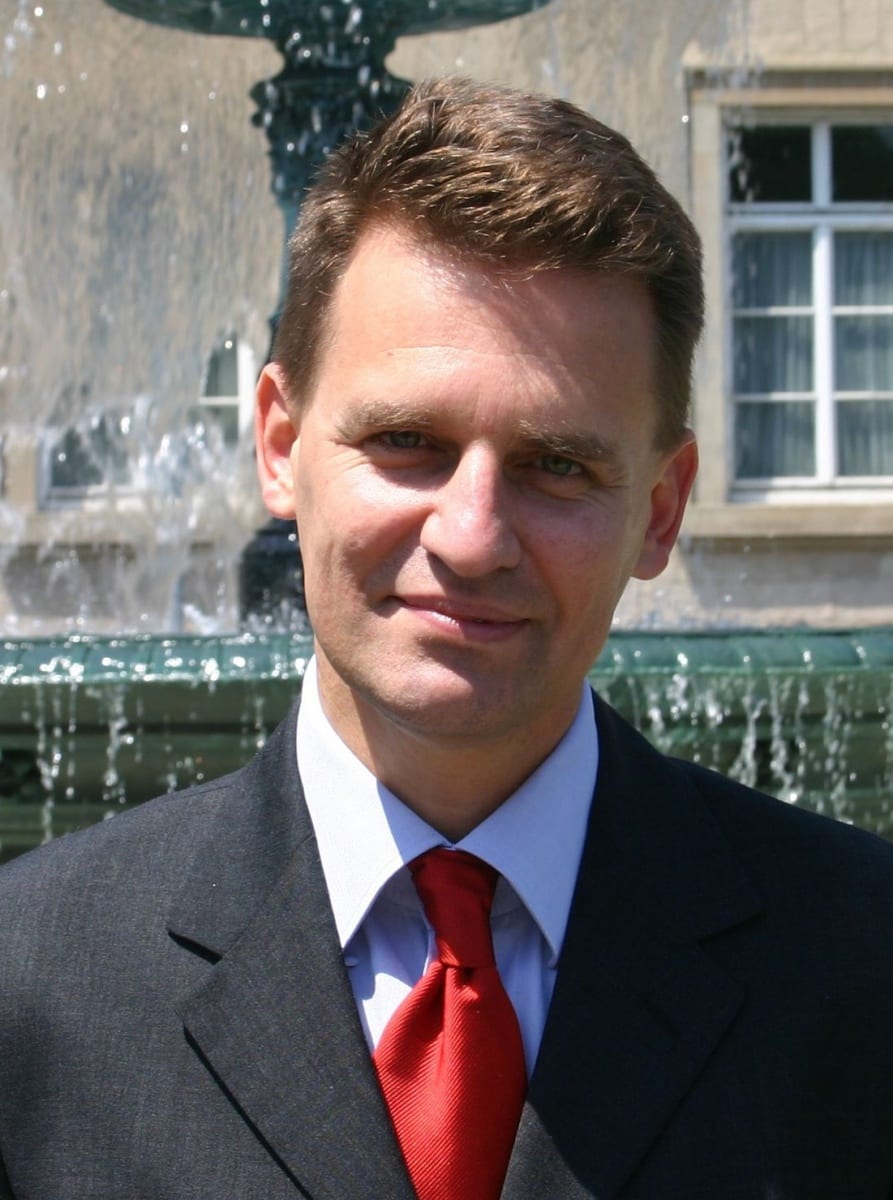 Lecture on “European Fundamental Rights Federalism: When Are EU Member States Bound by EU Fundamental Rights?”
Lecture on “European Fundamental Rights Federalism: When Are EU Member States Bound by EU Fundamental Rights?”
Martin Nettesheim
Professor of Law and Director of the Tübingen University Center for International Economic Law (TURCIEL)
Tübingen University
201 Moses Hall, 12:00-1:30 pm
Co-sponsored with the Institute of European Studies
The European Court of Justice began to develop its fundamental rights jurisprudence in the 1970s. Its activities became controversial when the Court started to apply EU fundamental rights to Member state institutions in situations where only a loose connection to EU substantive law existed. The future architecture of the EU and its federal distribution of powers will be determined to a considerable extent by the division of the court that prevails in increasingly heated debates. This lecture will propose a reversal of traditional approaches to the problem, shifting focus and responsibility for any given situation from the member state in question to the EU.
(L-R) Berkeley Law Professor David Oppenheimer, Martin Nettesheim
and IES Director Jeroen Dewulf
April 2, 2015 (Thursday)
.jpg) Lecture on “Drones, ‘Targeted Killing,’ and the Law”
Lecture on “Drones, ‘Targeted Killing,’ and the Law”
David Glazier
Loyola Law School
12 Law Building 12:45-2:00 pm
Co-sponsored with the Boalt Association of Military and Veterans (BAMV) and the Boalt Veterans Assistance Project (BVAP)
Lunch will be provided to students, faculty, and staff who RSVP to nmonacelli@berkeley.edu by March 31
Dave Glazier is a professor of law at Loyola Law School, Los Angeles, where his teaching and scholarship focus on international law governing the resort to the use of force and the conduct of hostilities. He previously spent 21 years serving as a US Navy surface warfare officer, culminating in command of USS George Philip, a San Diego-based guided missile frigate. He also served in variety of political-military affairs billets, including tours as the Seventh Fleet staff officer responsible for the US Navy-Japan relationship and the Pacific Fleet staff officer dealing with China. After retiring from the Navy in the summer of 2001, he earned his JD from the University of Virginia School of Law and spent two years as a research fellow at the Center for National Security Law before starting work at Loyola. He is frequently called upon for expert commentary on law of war issues, military commissions, the use of drones for targeted killing, and piracy.
BAMV and BVAP are sponsored by the Associated Students of the University of California (ASUC).
April 2, 2015 (Thursday)
 Discussion on “Justice for the Disappeared”
Discussion on “Justice for the Disappeared”
110 Law Building, 6:00-8:00 pm
Co-sponsored with Boalt Hall Committee for Human Rights, Human Rights Center, International Human Rights Law Clinic, La Raza Student Association, and UC Berkeley’s Chicano/Latino Studies Program and the Department of Spanish and Portuguese
On September 26, 2014, 43 students from the Ayotzinapa Normal School were detained by security forces and disappeared while in Iguala, Guerrero. The crime has stirred indignation and protests in Mexico and around the world.
Please join us for a discussion with the students’ parents and Jim Cavallaro, Professor of Law at Stanford Law School & Commissioner, Inter-American Commission of Human Rights.
April 6, 2015 (Monday)
 2015 Riesenfeld Symposium
2015 Riesenfeld Symposium
Organized by the Berkeley Journal of International Law
Sponsored by the Miller Institute for Global Challenges and the Law
▪ ▪ ▪
Lunch Panel on “Conflict Now: The Role of International Courts”
110 Law Building, 12:45-2:00pm
Panelists:
▪ Jeremy Sharpe, US Department of State
▪ Allen Weiner, Director of the Stanford Program in International and Comparative Law and Co-Director of the Stanford Center for International Conflict and Negotiation
▪ Laurel Fletcher, Director of Berkeley Law’s International Human Rights Clinic
▪ Katerina Linos, Professor at Berkeley Law specializing in international human rights and discrimination law
Moderated by Neil Popovic, Lecturer-in-Residence, Berkeley Law, and Partner at Sheppard Mullin Richter & Hampton LLP
This year’s Riesenfeld Symposium will kick off with a lunch panel discussion highlighting the role of international courts in resolving today’s most prominent international disputes and whether the courts are the most effective means by which to resolve these conflicts. Our esteemed panelists will provide a diverse view of the effectiveness and reliability of international courts based on their unique individual backgrounds and expertise. Lunch will be served.

(L-R) Neil Popovic, Allen Weiner, Katerina Linos, Laurel Fletcher, and Jeremy Sharpe
▪ ▪ ▪
Keynote Speech: “Remembering Professor Riesenfeld: Imaginary Conversations”
.jpg) Judge Joan Donoghue (’81)
Judge Joan Donoghue (’81)
International Court of Justice
Booth Auditorium, Boalt Hall, 4:00pm-6:00pm
Introduction by Dean Sujit Choudhry, Berkeley Law
Commentary by Professor Richard Buxbaum, Berkeley Law
The 2015 Stefan A. Riesenfeld Memorial Award for outstanding contributions to the field of International Law will be awarded to the esteemed Berkeley Law alumna, Judge Joan Donoghue of the International Court of Justice. Judge Donoghue has been a member of the ICJ since 2010, and is only the third woman elected to be a member of the Court. Before joining the court, she served as the Principal Deputy Legal Advisor at the US Department of State.
Please join us in honoring Judge Donoghue with this award. The Judge will then present her keynote speech entitled “Remembering Professor Riesenfeld: Imaginary Conversations,” and will be followed by a brief Q&A.
▪ ▪ ▪
Reception
Warren Room (295 Law Building), 6:00-7:00 pm
Immediately following the keynote speech and questions there will be a reception upstairs in the Warren Room. Appetizers and drinks will be served.
▪ ▪ ▪
If you would like to attend all or part of this year’s Riesenfeld Symposium please RSVP here.
For more information, please visit the Symposium website or Facebook page.
MCLE credit available for California Bar members.
.jpg)
Judge Joan Donoghue and Dean Sujit Choudhry with BJIL organizers
(L-R) Kathleen Tang, Terrance Robinson, Sydney Archibald,
Remi Moncel, and Kelsey Leeker
photos by Michael Bazeley and Kathleen Tang
April 8-11, 2015 (Wednesday-Saturday)
American Society of International Law Annual Meeting
Washington DC
The American Society of International Law (ASIL), with its membership of scholars, practitioners, and students of international law from around the world, will explore the theme of “Adapting to a Rapidly Changing World” at the 2015 Annual Meeting.
For more information, see the ASIL Annual Meeting website.
Berkeley Law is an ASIL Academic Partner.

April 9-10, 2015 (Thursday-Friday)
Dean’s Distinguished Lecture Series with Justice Albie Sachs
 The Miller Institute is co-sponsoring two events at Berkeley Law with Justice Albert “Albie” Sachs, a Distinguished Jurist-in-Residence. Albie Sachs is a noted human rights activist and former judge on the Constitutional Court of South Africa.
The Miller Institute is co-sponsoring two events at Berkeley Law with Justice Albert “Albie” Sachs, a Distinguished Jurist-in-Residence. Albie Sachs is a noted human rights activist and former judge on the Constitutional Court of South Africa.
Co-sponsored with the Henderson Center for Social Justice and the Human Rights Center
▪ ▪ ▪
April 9, 2015 (Thursday)
Screening of “Soft Vengeance”
Booth Auditorium, 5:30-7:30 pm
Followed by a Q&A with Albie Sachs and filmmaker Abby Ginzberg
“Soft Vengeance” is a film about Albie Sachs, a lawyer, writer, art lover and freedom fighter, set against the dramatic events leading to the overthrow of the apartheid regime in South Africa. Shining a spotlight on his story provides a prism through which to view the challenges faced by those unable to tolerate a society founded on principles of slavery and disempowerment of South Africa’s majority black population.
As a young man, Albie defended those committed to ending apartheid in South Africa. For his actions as a lawyer, he was imprisoned, tortured and forced into exile. In 1988 he was victim of a car bomb which cost him his right arm and the sight of one eye. Returning to South Africa following the release of Nelson Mandela, Albie helped write the new Constitution and was then appointed as one of the first 11 judges to the new Constitutional Court, which for the past 20 years has been insuring that the rights of all South Africans are afforded protection.
Please RSVP here.
▪ ▪ ▪
April 10, 2015 (Friday)
Lecture on “The Sacred and the Secular: Same-Sex Marriage in South Africa”
110 Law Building, 12:30-2:00 pm.
Ten years ago South Africa’s Constitutional Court was asked to decide if the failure of the law to permit same-sex couples to marry was compatible with the country’s new democratic Constitution. The Court’s decision that the non-inclusion of same-sex couples was unconstitutional was handed down by Justice Sachs. In his opinion, Justice Sachs argued that It is one thing for the Constitutional Court to acknowledge the important role that religion plays in public life; it is quite another for it to use religious doctrine as a source for interpreting the Constitution. He will speak about the issues dealt with in his opinion, as well as the dissenting view presented on one aspect of the case by his colleague Justice Kate O’Regan.
Lunch will be served. Register here.
April 10, 2015 (Friday)
.jpg) Deadline for submitting application for Certificate of Specialization in International Law
Deadline for submitting application for Certificate of Specialization in International Law
Berkeley Law students may undertake a specialization in international law. The specialized curricular program ensures students develop a broad background in fundamental areas of law while receiving advanced training in international law. Students who meet the requirements are awarded a Certificate of Specialization in International Law.
For more information on the requirements for the certificate and an application, click here.
April 16, 2015 (Thursday)
 Lecture on “Taxing Transnational Households: A Solution To Lost Tax Revenue in Migrant-Source Countries”
Lecture on “Taxing Transnational Households: A Solution To Lost Tax Revenue in Migrant-Source Countries”
Ariel Stevenson
134 Law Building, 12:45-2:00 pm
Lunch served while supplies last
Sponsored by the Berkeley Journal of International Law
Developing countries with significant outmigration face a unique policy dilemma when it comes to raising revenue. While emigration reduces domestic human capital and tax revenue, it simultaneously improves outcomes for migrant workers and their families. Thus, governments must balance conflicting needs to maximize government revenue while protecting the welfare of migrant worker households.
Although counterintuitive and perhaps controversial, migrant-source countries may find a solution to this dilemma by taxing the income remitted by migrant workers to family members remaining back in home countries. If constructed properly, a tax on remittance payments could raise revenue without burdening migrant workers or restricting their freedom to migrate. In this talk, I will push back against common anti-remittance-taxation arguments based on both normative and practical considerations, with a focus on improving and updating the taxation of families separated by national borders.
To view her paper, click here.
April 27-28, 2015 (Monday-Tuesday)
Public International Conference on “Reflections on the Legacy of Nuremberg: The 70th Anniversary of the Nuremberg Trials”
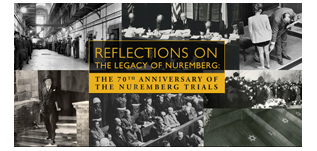 A Partnership of the Center for Jewish Studies, The Joseph and Eda Pell Endowed Fund for Jewish Studies, and the Berkeley Institute for Jewish Law and Israel Studies
A Partnership of the Center for Jewish Studies, The Joseph and Eda Pell Endowed Fund for Jewish Studies, and the Berkeley Institute for Jewish Law and Israel Studies
[LINK TO PUBLIC REGISTRATION PAGE]
[LINK TO STUDENT/FACULTY/STAFF REGISTRATION PAGE]
▪ ▪ ▪
April 27, 2015 (Monday)
Film Screening of “Nuremberg: Its Lesson for Today”
The Magnes Collection of Jewish Art and Life, 2121 Allston Way, Berkeley
5:30 pm – reception
6:15 pm – screening
7:00 pm – Q&A with filmmaker and producer Sandra Schulberg and Professor Richard Buxbaum, Berkeley Law
The film screening and discussion are free and open to the public. RSVP here.
▪ ▪ ▪
April 28, 2015 (Tuesday)
Conference
Bancroft Hotel, 2680 Bancroft Way, Berkeley
8:30 am-1:00 pm
The keynote presentation by Canadian Supreme Court Justice Rosalie Abella is free and open to the public. RSVP for the keynote here.
The entire conference is open to the public. The corporate rate is $65; the non-profit/community rate is $35. The conference is free for Berkeley and other universities’ students, faculty, and staff. A student/Berkeley id will be required.
May 14, 2015 (Thursday)
Certificate of Specialization in International Law Award Ceremony
132 Law Building, 2:00-3:30 pm
Please join us in recognizing the extraordinary achievements of the Berkeley Law students as recipients of the Certificate of Specialization in International Law.
RSVP by May 6 to InternationalLawCertificate@law.berkeley.edu.
2015 certificate honorees with Berkeley Law professors
